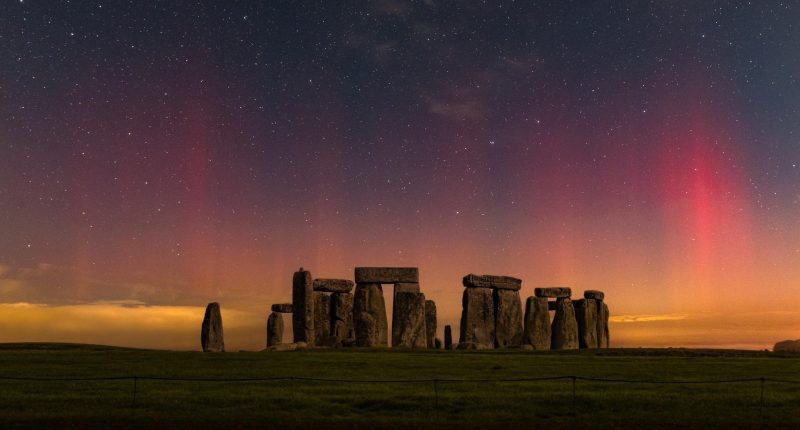The Northern Lights graced UK skies on Sunday night, in a dazzling display that has left onlookers stunned.
The red and green hues of the Aurora Borealis were mostly observed over Scotland, but some sightings were reported across central and eastern parts of England.
Central Wales, UK, and parts of North America were also able to catch a glimpse of the bucket-list sighting.
The display even outshone Guy Fawkes Night in the UK, when the skies are usually alight with fireworks.
X (formerly Twitter) user @graemeshinnie said: “The Northern Lights overshadowed the fireworks on the 5th November.”
READ MORE ON NORTHERN LIGHTS
In North America, where the lights were also visible, X user @emilyjademc tweeted: “Tonight was the first time I’ve ever seen the Northern Lights completely clearly with my eyes!!
“It was incredible. They were right overhead at one point and I had no idea how fast they move!! It’s just indescribable.”
But others across the UK and North America weren’t so lucky.
“Unlike basically the whole of Europe and the UK, I did not see the Northern Lights and I am not pleased,” X user @umacf24 tweeted.
Most read in Tech
There’s still hope for another chance to see the display, however.
During the long winter nights in November and December, the lights are going to be visible to skygazers across the UK.
There is also set to be a big uptick in Northern Lights sightings next year, according to scientists.
During the Solar Maximum, the Sun produces “dramatically more” auroral displays, according to Darren Baskill, a physics and astronomy lecturer at Sussex University.
“We’re now approaching the maximum, so I’d expect high levels and basically every few days seeing aurora,” Baskill told Norwegian travel company Hurtigruten.
“Whereas five years ago, you might have to wait weeks to see anything.”
The Solar Maximum is when solar activity peaks, which occurs every 11 years or so.
The next high point had been forecast for July 2025.
However, the Solar Maximum will arrive earlier than expected, according to Nasa scientist Robert Leamon and Scott McIntosh, deputy director at the US National Centre for Atmospheric Research (NCAR).
Read More on The Sun
They say the cycle’s peak will occur a year earlier in mid-to-late 2024.
This means the best time of the decade to tick the Northern Lights off your bucket list is right around the corner.
Best Phone and Gadget tips and hacks

Looking for tips and hacks for your phone? Want to find those secret features within social media apps? We have you covered…













